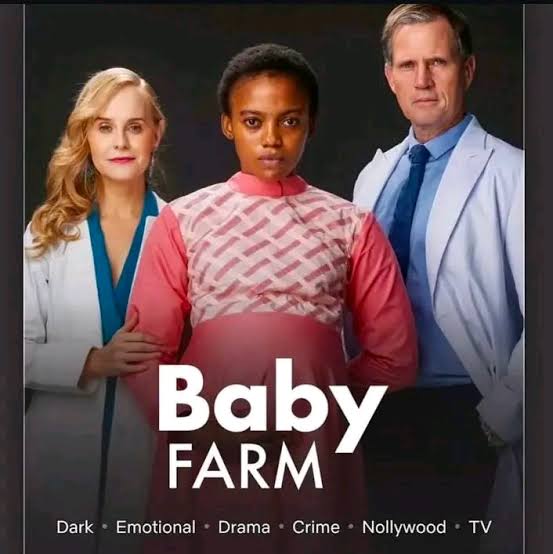
Baby Farm Review: EbonyLife's Gritty Take on Nigeria's Baby Trafficking Crisis
Baby Farm Review: EbonyLife’s Gritty Take on Nigeria’s Baby Trafficking Crisis
Netflix Release: March 21, 2025 | Episodes: 5 | Genre: Psychological Thriller | Executive Producer: Mo Abudu
Plot & Social Relevance
EbonyLife Studios’ Baby Farm tackles one of Nigeria’s most disturbing criminal enterprises – the trafficking of newborns through fake NGOs. The miniseries follows Adanna (Onyinye Odokoro), a pregnant woman who entrusts her twins to The Evans Foundation, only to discover its true nature as a baby harvesting operation.
The narrative weaves together three perspectives:
- Adanna’s nightmarish captivity
- Ebun’s (Genoveva Umeh) moral crisis as a complicit worker
- Mide’s (Rita Dominic) desperate quest for motherhood
Strengths: Powerful premise rooted in real social issues, tense escape sequences, shocking twists
Weaknesses: Uneven pacing, underdeveloped subplots (especially Mide’s story), rushed finale
Direction & Technical Execution
Co-directors Walter Taylaur and Kayode Kasum create an atmosphere of claustrophobic dread, particularly in the farm’s grim dormitories. However, the series struggles with tonal consistency:
- Visual Style: Egor Povolotskiy’s cinematography uses a sickly green-gray palette to emphasize the story’s grim reality
- Standout Scene: Ebun’s confrontation with Barbara Evans (Jenny Stead) – tight framing and sharp editing heighten the tension
- Missed Opportunities: Abrupt edits disrupt emotional moments; some transitions between storylines feel jarring
The production design effectively contrasts Lagos’ vibrancy with the farm’s institutional horror, though the direction sometimes sacrifices subtlety for shock value.
Cast Performances
The ensemble delivers Baby Farm’s most compelling elements:
Raw portrayal of desperation and resilience. Her labor scene is particularly harrowing.
The emotional core – her transformation from accomplice to rebel is the series’ highlight.
Brings depth to an underwritten role, especially in the adoption storyline.
Chilling as the calculating mastermind behind the operation.
Supporting actors like Joseph Benjamin and Tope Tedela make strong impressions despite limited screen time.
Cultural & Linguistic Authenticity
Baby Farm authentically captures Nigeria’s linguistic diversity:
- Language Blend: Code-switching between English, Pidgin, and Igbo adds realism
- Class Dynamics: The Evans’ formal English contrasts with the victims’ Pidgin
- Powerful Lines: Ebun’s Pidgin confession (“Wetin we dey do here no good”) resonates deeply
While most dialogue feels natural, some expository English lines come across as stiff, briefly breaking immersion.
FAQs About Baby Farm
1. Is Baby Farm based on true events?
While fictional, it’s inspired by real reports of baby factories in Nigeria where young women are imprisoned to birth children for sale.
2. How many episodes are there?
Five episodes, each approximately 45-55 minutes long.
3. Who are the directors?
Co-directed by Walter Taylaur (known for “Slum King”) and Kayode Kasum (“Sugar Rush”).
4. Is the series appropriate for sensitive viewers?
Due to intense themes of forced pregnancy and violence, viewer discretion is advised.
5. How does this compare to other EbonyLife productions?
More graphic than their usual fare, but maintains their signature blend of social commentary and entertainment.
Final Verdict: A Flawed But Important Thriller
Baby Farm represents Nollywood’s growing ambition to tackle difficult social issues through genre storytelling. While hampered by pacing issues and underdeveloped subplots, its powerful performances (especially Umeh and Odokoro), chilling premise, and stark visuals make it worth watching.
The series succeeds most when focusing on Adanna and Ebun’s intertwined journeys, though it occasionally stumbles in balancing its thriller elements with deeper character exploration. Despite its imperfections, Baby Farm shines a necessary light on Nigeria’s baby trafficking crisis, joining Netflix’s growing catalog of socially conscious African narratives.
Who should watch: Fans of psychological thrillers, viewers interested in African social issues, and those who appreciated similar EbonyLife productions like “Blood Sisters.”
Content Warning: Contains scenes of forced childbirth, psychological manipulation, and violence against women.







1 thought on “Baby Farm Review: EbonyLife’s Gritty Take on Nigeria’s Baby Trafficking Crisis”